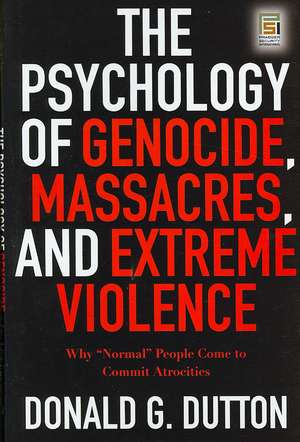The Psychology of Genocide, Massacres, and Extreme Violence: Why Normal People Come to Commit Atrocities: Praeger Security International
Autor Donald G. Duttonen Limba Engleză Hardback – 29 mai 2007 – vârsta până la 17 ani
Din seria Praeger Security International
- 18%
 Preț: 334.19 lei
Preț: 334.19 lei - 8%
 Preț: 335.53 lei
Preț: 335.53 lei - 34%
 Preț: 376.10 lei
Preț: 376.10 lei - 46%
 Preț: 443.64 lei
Preț: 443.64 lei - 29%
 Preț: 240.11 lei
Preț: 240.11 lei - 8%
 Preț: 304.56 lei
Preț: 304.56 lei - 34%
 Preț: 373.82 lei
Preț: 373.82 lei - 19%
 Preț: 412.79 lei
Preț: 412.79 lei - 19%
 Preț: 338.42 lei
Preț: 338.42 lei - 18%
 Preț: 335.62 lei
Preț: 335.62 lei - 27%
 Preț: 377.35 lei
Preț: 377.35 lei - 27%
 Preț: 376.75 lei
Preț: 376.75 lei - 18%
 Preț: 336.46 lei
Preț: 336.46 lei - 18%
 Preț: 321.73 lei
Preț: 321.73 lei - 27%
 Preț: 384.51 lei
Preț: 384.51 lei - 18%
 Preț: 320.50 lei
Preț: 320.50 lei - 18%
 Preț: 320.50 lei
Preț: 320.50 lei - 18%
 Preț: 321.35 lei
Preț: 321.35 lei - 24%
 Preț: 420.54 lei
Preț: 420.54 lei - 14%
 Preț: 335.99 lei
Preț: 335.99 lei - 18%
 Preț: 355.82 lei
Preț: 355.82 lei - 18%
 Preț: 319.83 lei
Preț: 319.83 lei - 18%
 Preț: 334.28 lei
Preț: 334.28 lei - 32%
 Preț: 354.48 lei
Preț: 354.48 lei - 14%
 Preț: 335.14 lei
Preț: 335.14 lei - 38%
 Preț: 405.98 lei
Preț: 405.98 lei - 40%
 Preț: 571.34 lei
Preț: 571.34 lei - 18%
 Preț: 321.85 lei
Preț: 321.85 lei - 18%
 Preț: 323.25 lei
Preț: 323.25 lei - 18%
 Preț: 253.28 lei
Preț: 253.28 lei - 40%
 Preț: 571.50 lei
Preț: 571.50 lei - 14%
 Preț: 333.72 lei
Preț: 333.72 lei - 18%
 Preț: 301.73 lei
Preț: 301.73 lei - 19%
 Preț: 352.96 lei
Preț: 352.96 lei - 26%
 Preț: 387.80 lei
Preț: 387.80 lei - 18%
 Preț: 302.77 lei
Preț: 302.77 lei - 14%
 Preț: 333.91 lei
Preț: 333.91 lei - 17%
 Preț: 325.80 lei
Preț: 325.80 lei - 24%
 Preț: 338.58 lei
Preț: 338.58 lei - 34%
 Preț: 414.73 lei
Preț: 414.73 lei - 18%
 Preț: 354.30 lei
Preț: 354.30 lei - 29%
 Preț: 254.29 lei
Preț: 254.29 lei - 18%
 Preț: 354.11 lei
Preț: 354.11 lei - 18%
 Preț: 334.38 lei
Preț: 334.38 lei - 14%
 Preț: 302.68 lei
Preț: 302.68 lei - 18%
 Preț: 322.97 lei
Preț: 322.97 lei - 27%
 Preț: 376.50 lei
Preț: 376.50 lei - 27%
 Preț: 322.81 lei
Preț: 322.81 lei - 27%
 Preț: 382.91 lei
Preț: 382.91 lei - 18%
 Preț: 320.87 lei
Preț: 320.87 lei
Preț: 335.03 lei
Preț vechi: 408.94 lei
-18% Nou
Puncte Express: 503
Preț estimativ în valută:
64.11€ • 67.11$ • 53.04£
64.11€ • 67.11$ • 53.04£
Carte tipărită la comandă
Livrare economică 05-19 aprilie
Preluare comenzi: 021 569.72.76
Specificații
ISBN-13: 9780275990008
ISBN-10: 0275990001
Pagini: 216
Dimensiuni: 156 x 235 x 21 mm
Greutate: 0.49 kg
Editura: Bloomsbury Publishing
Colecția Praeger
Seria Praeger Security International
Locul publicării:New York, United States
ISBN-10: 0275990001
Pagini: 216
Dimensiuni: 156 x 235 x 21 mm
Greutate: 0.49 kg
Editura: Bloomsbury Publishing
Colecția Praeger
Seria Praeger Security International
Locul publicării:New York, United States
Notă biografică
Donald G. Dutton is Professor of Psychology at the University of British Columbia. A Licensed Clinical Psychologist, Dutton has researched violence in forensic and domestic situations across 30 years. He has led court-mandated treatment groups for violent offenders, interviewed spousal killers, and authored four books plus more than 100 articles on the psychological mechanisms of violence perpetrators. Dutton has appeared on Dateline NBC, Larry King Live, National Public Radio, and Good Morning America.
Recenzii
Dutton's volume..[i]s neither fictional prose nor cinematic image; nor is it a study of a particular historical act. Rather, is is a carefully documented work that leads the reader on a journey into humanity's heart of darkness through a chapter-by-chapter account of the brutal litanies of genocide, holocausts, military massacres, lynchings, prison riots, rapes, serial killers, and wars of the 20th century..[W]hat makes Dutton's volume unique and..[e]ssential reading for everyone is its straightforward, clear, and unadulterated presentation of the panorama of brutality that marks the 20th century..Dutton has written a book for our era that should be read by everyone. It compels us to explore the human heart of darkness.
Describing his work as a marriage of social and forensic psychology with history, Dutton aims to explain the psychological mechanisms that generate extreme violence, including genocide, military massacres, lynchings, and prison riots. Sadly, he finds that most people are capable of visiting horrific violence against others, especially in social situations wherein a subjectively defined out-group becomes perceived as a threat to an in- group's view of their place in the world. He also identifies B process dominance as the mechanism by which individuals become inured to brutality. However, he notes remaining limitations in psychological explanations of extreme violence.
[A]n exceptionally well written text which highlights an area of study which aggression and forensic researchers should take more interest in to understand both what promotes mass violence and what protects against it. I think Dutton has produced a book on this topic worthy pf accolade, if not simply for highlighting the importance of these issues and for presenting a detailed outline of how such atrocities have presented across the medieval and modern world. I hope that the text serves to stimulate empirical research into this important area of emerging study, and would encourage the disciplines of forensic psychology, sociology, and anthropology in particular to take interest.
Describing his work as a marriage of social and forensic psychology with history, Dutton aims to explain the psychological mechanisms that generate extreme violence, including genocide, military massacres, lynchings, and prison riots. Sadly, he finds that most people are capable of visiting horrific violence against others, especially in social situations wherein a subjectively defined out-group becomes perceived as a threat to an in- group's view of their place in the world. He also identifies B process dominance as the mechanism by which individuals become inured to brutality. However, he notes remaining limitations in psychological explanations of extreme violence.
[A]n exceptionally well written text which highlights an area of study which aggression and forensic researchers should take more interest in to understand both what promotes mass violence and what protects against it. I think Dutton has produced a book on this topic worthy pf accolade, if not simply for highlighting the importance of these issues and for presenting a detailed outline of how such atrocities have presented across the medieval and modern world. I hope that the text serves to stimulate empirical research into this important area of emerging study, and would encourage the disciplines of forensic psychology, sociology, and anthropology in particular to take interest.










